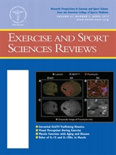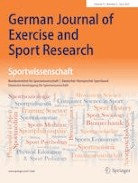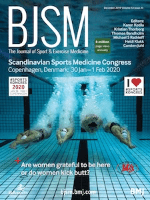
EXERCISE AND SPORT SCIENCES REVIEWS
Scope & Guideline
Empowering professionals with cutting-edge insights.
Introduction
Aims and Scopes
- Exercise Physiology and Metabolism:
Research exploring the biochemical and physiological responses to exercise, including metabolism, energy expenditure, and adaptations in various populations. - Neuromuscular Function and Performance:
Investigations into the mechanisms underlying muscle function, strength training, and performance optimization, focusing on both healthy individuals and those with specific conditions. - Psychological and Cognitive Aspects of Exercise:
Studies examining the relationship between physical activity and mental health, cognition, and emotional well-being, emphasizing the psychological benefits of exercise. - Aging and Exercise Interventions:
Research addressing the effects of aging on physical performance and health, and how exercise can mitigate age-related declines in function and health outcomes. - Exercise as Therapy for Chronic Conditions:
Exploration of exercise interventions as therapeutic strategies for managing chronic diseases, including metabolic disorders, cardiovascular health, and musculoskeletal conditions. - Innovative Exercise Modalities and Technologies:
Investigations into new forms of exercise, training methodologies, and the use of technology in enhancing exercise adherence and effectiveness. - Public Health and Physical Activity Promotion:
Research focused on the societal implications of exercise, including strategies for promoting physical activity across different populations.
Trending and Emerging
- Integrative Approaches to Exercise and Health:
There is a growing interest in the interplay between exercise and various health factors, including mental health, metabolic health, and chronic disease management, indicating a holistic view of exercise as a multifaceted intervention. - Microbiome and Exercise Interaction:
Emerging research linking exercise with gut microbiota suggests that physical activity may influence microbial diversity and health, opening new avenues for understanding the relationship between exercise and overall well-being. - Sex Differences in Exercise Response:
An increasing focus on sex-based differences in exercise physiology and response highlights the importance of understanding how gender may influence training outcomes and health benefits. - Exercise and Neuroplasticity:
Research exploring the effects of exercise on brain health and neuroplasticity is on the rise, reflecting a deeper understanding of how physical activity can enhance cognitive function and potentially mitigate neurodegenerative diseases. - Technology-Enhanced Exercise Interventions:
The integration of technology, such as wearable devices and apps, into exercise interventions is trending, as researchers explore their effectiveness in promoting physical activity adherence and outcomes. - Behavioral Science in Exercise Promotion:
There is an increasing emphasis on applying behavioral science principles to enhance exercise adherence and motivation, indicating a shift towards understanding the psychological factors that influence physical activity.
Declining or Waning
- Traditional Strength Training Techniques:
Research focusing on conventional strength training methods has seen a decline, possibly due to a growing interest in more innovative or functional training approaches that emphasize adaptability and sport-specific performance. - Basic Biomechanics Without Clinical Application:
Studies centered solely on basic biomechanical principles without direct clinical application are appearing less frequently, as the journal shifts towards research that connects biomechanics with practical outcomes in health and performance. - Generalized Exercise Recommendations Without Individualization:
There is a noticeable decrease in publications offering broad, generalized exercise recommendations, as the focus has shifted towards personalized and tailored approaches to exercise prescription. - Age-Specific Exercise Protocols in Isolation:
The exploration of age-specific exercise protocols in isolation has waned, likely due to a broader interest in integrative approaches that consider multiple factors influencing exercise response across varied populations.
Similar Journals

Journal of Exercise Rehabilitation
Empowering Recovery with Cutting-Edge Exercise InsightsThe Journal of Exercise Rehabilitation is a leading academic publication dedicated to advancing the field of physical therapy, sports therapy, and rehabilitation. Published by the Korean Society of Exercise Rehabilitation, this open-access journal, available since 2013, facilitates the dissemination of high-quality research and innovative practices in exercise rehabilitation. With an impressive impact factor and an H-index reflecting its academic influence, the journal is ranked in the Q2 category for Physical Therapy and Sports Therapy and Rehabilitation, and Q3 for Orthopedics and Sports Medicine as of 2023. Operating from South Korea, it serves as a vital platform for researchers, practitioners, and students alike, fostering collaboration and the sharing of knowledge across borders. By including studies that span from 2017 to 2024, it not only highlights significant advances in the field but also encourages ongoing exploration and discussion. Engage with the Journal of Exercise Rehabilitation to contribute to this dynamic and evolving discourse in rehabilitation science.

Annals of Applied Sport Science
Connecting Research and Practice in Sports and RecreationThe Annals of Applied Sport Science, published by ANNALS APPLIED SPORT SCIENCE, is an esteemed open-access journal dedicated to advancing research in the fields of applied psychology, orthopedics, sports medicine, physical therapy, and social sciences related to sports and recreation. Launched in 2013, this journal aims to foster collaboration among researchers, practitioners, and educators by disseminating high-quality, peer-reviewed research that addresses contemporary issues in sports science and practices. Operating from Iran, the journal has demonstrated its significance by maintaining a strong presence in various academic rankings, including Q4 rank in Applied Psychology and Q3 ranks in Orthopedics and Sports Medicine, demonstrating its multidisciplinary approach. As it embarks on converging research from 2017 to 2024, the journal welcomes contributions that span innovative methodologies, evidence-based practices, and critical discussions that shape future perspectives in sports-related fields. With an accessible format, the Annals of Applied Sport Science is poised to make a lasting impact on its community of readers, including researchers, professionals, and students eager to engage with cutting-edge findings and trends.

Translational Journal of the American College of Sports Medicine
Empowering Practitioners with Cutting-edge Research Insights.Translational Journal of the American College of Sports Medicine is a pivotal publication dedicated to advancing the field of sports medicine and rehabilitation. Published by LIPPINCOTT WILLIAMS & WILKINS, this journal serves as an essential platform for researchers, practitioners, and students keen on the latest innovative research and clinical practices. With a particular focus on orthopedics and sports therapy, this journal aims to bridge the gap between research and practical application, promoting improved patient outcomes in physical therapy and rehabilitation settings. The journal positions itself as a thought leader within its field, evidenced by its respectable Q2 quartile ranking in Physical Therapy and Rehabilitation and Q3 ranking in Orthopedics and Sports Medicine as of 2023. Although not an open-access publication, the journal remains committed to disseminating high-quality, peer-reviewed articles that inspire new methodologies and evidence-based practices. Historically converging from 2021 to 2024, the journal continues to garner attention in both the academic community and clinical practice, highlighting its significance as a resource for contemporary sports medicine. Researchers are encouraged to submit their work to contribute to this vibrant and growing area of study.

Sport TK-Revista Euroamericana de Ciencias del Deporte
Championing Global Research in Sports and Health SciencesSport TK-Revista Euroamericana de Ciencias del Deporte is a prestigious open access journal published by the University of Murcia in Spain, focusing primarily on the interdisciplinary fields of sports science, occupational therapy, physical therapy, and rehabilitation. Since its inception, the journal has gained recognition for disseminating original research and scholarly articles that contribute significantly to the advancement of knowledge in these domains. With an ISSN of 2340-8812 and an E-ISSN also of 2340-8812, Sport TK has been committed to open access since 2012, enhancing its global reach and accessibility for researchers, professionals, and students alike. The journal's current rankings indicate its relevance, being classified in quartile Q3 in Complementary and Manual Therapy and Q4 in several other categories such as Education and Physical Therapy. By bridging academic inquiry with practical application, Sport TK plays a pivotal role in promoting evidence-based practices and fostering collaboration amongst professionals dedicated to health and wellness in the sports sector.

Biomedical Human Kinetics
Innovating Physical Therapies for Enhanced HealthBiomedical Human Kinetics, an esteemed academic journal published by SCIENDO, focuses on the intricate intersections of human movement, rehabilitation, and the study of physical therapies. Since its transition to an open access model in 2009, this journal has become a vital platform for sharing groundbreaking research and innovative methodologies in the fields of Orthopedics, Sports Medicine, and Physical Therapy. With an ISSN of 0043-9630 and an E-ISSN of 2080-2234, it operates out of Poland, providing global access to high-quality research. The journal’s standing in 2023 is notable, ranking in the Q3 category for both Orthopedics and Sports Medicine and Physical Therapy, Sports Therapy, and Rehabilitation, reflecting its commitment to fostering academic discourse within these important and evolving domains. Furthermore, with Scopus rankings placing it in the 36th percentile in its categories, Biomedical Human Kinetics is recognized for its contributions to the academic community. As it converges research efforts from 2016 to 2024, this journal serves as a cornerstone for researchers, professionals, and students dedicated to enhancing human health and performance through informed scientific exploration.

German Journal of Exercise and Sport Research
Connecting researchers and practitioners in exercise science.German Journal of Exercise and Sport Research is a leading academic publication dedicated to advancing the understanding of exercise, physical therapy, and sports medicine. Published by SPRINGER in Germany, this journal serves as a vital resource for researchers, practitioners, and students in the fields of Physical Therapy, Sports Medicine, and Rehabilitation. With a 2023 impact factor that positions it within Q2 in Physical Therapy and Q3 in Orthopedics and Sports Medicine, it ranks favorably, holding the 111th position among 247 in its category, and the 162nd position among 321 in Orthopedics. The journal emphasizes quality, rigor, and innovation in its articles published since its inception in 2017, culminating in converged years of research through 2024. By publishing original research, review articles, and clinical studies, the journal aims to facilitate knowledge transfer and foster collaboration among professionals in the field. While it does not currently offer an open access option, it ensures that the highest quality research is accessible to a global audience. The German Journal of Exercise and Sport Research is essential for anyone aiming to stay abreast of the latest developments in exercise science and therapeutic practices.

BRITISH JOURNAL OF SPORTS MEDICINE
Unlocking the Secrets of Sports Health Since 1964British Journal of Sports Medicine (BJSM) is a premier academic journal that stands at the nexus of sports science and medicine, dedicated to advancing the understanding and practice of sports health. Published by the BMJ Publishing Group, this esteemed journal has been delivering high-quality, peer-reviewed research since its inception in 1964 and continues to be a crucial resource for professionals and researchers in the fields of orthopedics, sports medicine, and rehabilitation. With an impressive impact factor and consistently ranked in the Q1 category across multiple relevant disciplines according to the latest metrics, BJSM is a vital platform that disseminates essential findings that shape clinical practice and influence policy. Located in the heart of London, UK, it provides unrestricted access to groundbreaking research, critiques, and reviews that address the latest challenges in sports health. Whether you are a seasoned researcher, a budding sports medicine professional, or a dedicated student, the British Journal of Sports Medicine is your go-to source for the latest advances and insights in the ever-evolving landscape of sports health and performance.

Translational Sports Medicine
Connecting Science to Sports PerformanceTranslational Sports Medicine, published by WILEY-HINDAWI, is a distinguished open access journal that has been at the forefront of sports medicine research since its inception in 2018. With an E-ISSN of 2573-8488, this journal aims to bridge the gap between laboratory research and clinical application, fostering the translation of groundbreaking findings into effective sports medicine practices. Situated in the United Kingdom, it has achieved recognition in the academic community, currently holding a Q2 ranking in the fields of Orthopedics and Sports Medicine, with a Scopus ranking of #143 out of 321 in its category. The journal welcomes diverse contributions, making it an essential resource for researchers, professionals, and students eager to advance their understanding of the field. With open access options since 2022, Translational Sports Medicine ensures that high-quality research is accessible to a global audience, thereby enhancing the dissemination of knowledge that can significantly impact sports health and performance.

RESEARCH QUARTERLY FOR EXERCISE AND SPORT
Transforming Health and Performance Through Scholarly InquiryRESEARCH QUARTERLY FOR EXERCISE AND SPORT, published by Routledge Journals, Taylor & Francis Ltd, stands as a premier publication dedicated to advancing knowledge in the fields of physical therapy, sports medicine, and exercise science. With an impressive impact factor and a well-established reputation, this journal has consistently ranked among the top in multiple disciplines, including Q1 in Physical Therapy, Sports Therapy, and Rehabilitation. Covering a broad array of topics from clinical practices to innovative research, the journal fosters a platform for interdisciplinary collaboration and evidence-based practice. Its open access policy enables wider dissemination of groundbreaking research, appealing to a diverse audience of researchers, clinicians, and students. As it continues to contribute to the evolution of sports science and medicine, the RESEARCH QUARTERLY FOR EXERCISE AND SPORT remains an essential resource for those dedicated to enhancing health and performance through rigorous scholarly inquiry.

Sport Sciences for Health
Enhancing Performance, Elevating Health OutcomesSport Sciences for Health is a leading journal published by SPRINGERNATURE that aims to advance the understanding and application of sports science within healthcare contexts. Established in 2004, this journal has successfully provided a platform for innovative research and discussions in the fields of Orthopedics, Sports Medicine, and general Sports Science, achieving a commendable Q3 ranking in both categories as per the 2023 Scopus quartile rankings. With an active publication schedule through 2024, Sport Sciences for Health offers invaluable insights for researchers, professionals, and students who are eager to explore the intricate relationships between sport and health outcomes. This journal, set in Italy, encourages the dissemination of significant findings that can enhance athletic performance, rehabilitation strategies, and public health initiatives, fostering an integrative approach to both theory and practical applications in the realm of sport sciences.